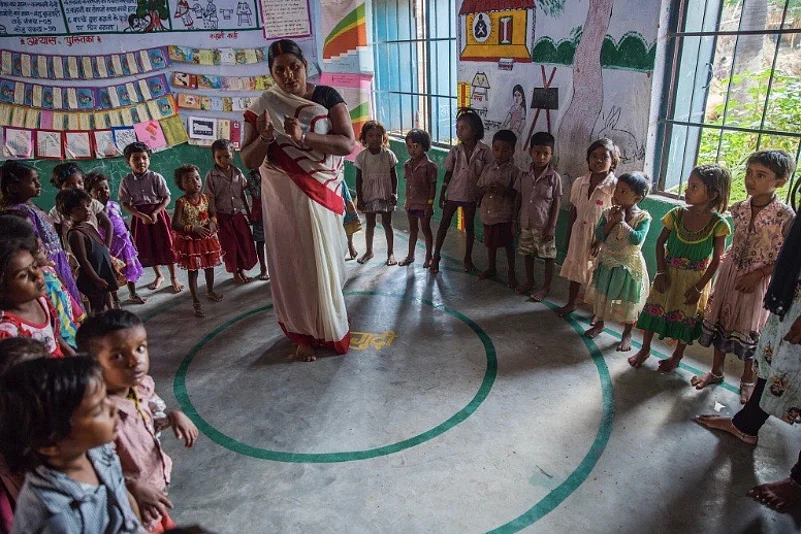To combat malnutrition in the country, the Union government has formulated a plan to develop a robust Ayush-based nutrition and health system.
For this, a pilot programme will be rolled out at about 10,000 Anganwadi centres to test the efficacy of the Ayush-based intervention and nutritional support in addressing problems of malnutrition and malnourishment, and “build a strong body of evidence.”
“The data generated in this initiative will be scientifically evaluated and analysed,” says a concept note on the programme, recently shared by the Union ministry for women and child development (WCD) with the states.
The objective of the programme is to create a mechanism to promote “healthy diet and lifestyle modification as per Ayurveda” as well as prevent and overcome malnutrition by providing proper Ayush care to pregnant and lactating mothers as well as children at various stages
“While the ministry of health and family welfare is taking care of severe acute malnutrition, the ministry of Ayush and ministry of women and child development will take care of the mild and moderate form of malnutrition,” the concept note says.
The Ayush intervention will be designed considering the local availability of food items, local food habits, climatic conditions and culture to optimize their acceptability in the community, it adds.
The Ayush systems advocate holistic wellness approach, aiming at prevention of diseases and promotion of health for achieving a state of wellbeing. The national health policy of 2017 had recommended mainstreaming the potential of Ayush systems within a pluralistic system of integrative healthcare for wellness and prevention of diseases.
“There is a broad scope for the Ayush intervention to supplement the nutrition and to create awareness in the community about the tradition-based Ayush food recipes, which not only help in recovery from the disease but also help in the prevention of many disease conditions,” the concept note underlines.
Although, there are many programmes rolled out in India to address the problem of malnutrition, malnutrition among women and children continues to remain high. Results of the fifth round of the national family health survey (NHFS-5) conducted in 22 states and union territories shows a rise in the prevalence of anaemia among women and children as well as an increase in the percentage of stunted, wasted and underweight children. Several states have also witnessed a rise in obesity among children.
“The potential of Ayurveda can be utilized to address the malnutrition in women and children. The medicine of Ayurveda bears proven long history of safe use,” the concept note says.
In September last year, the ministry of Ayush had signed a memorandum of understanding (MoU) with the WCD ministry to work together for providing “holistic nutritional care” for women and children to address the issue of malnutrition.
The Ayush ministry will provide technical guidance and support for developing and providing nutritional supplements for children, pregnant and lactating women based on regional and climatic preferences and principles and practices under the Ayush systems. It will also assist in organizing yoga demonstration sessions by yoga instructors deployed at Ayush health and wellness centres (HWCs) and provide nutritional counselling at Anganwadi centres.
The WCD ministry will provide operational support to Ayush functionaries within the Anganwadi setup. It will also provide support in sensitizing Anganwadi workers/helpers, supervisors, district programme officers and child development project officers to ensure that they become active partners in the implementation of the programme.
“WCD ministry will provide adequate resources to support all the interventions,” the concept note underlines.
By the end of this year, the concept note says, at least 4000 health and wellness centres (HWCs) under the Ayushman Bharat will become operational under the Ministry of Ayush. Nearby Anganwadi centres will be attached to these HWCs.
Anganwadi centres will also be attached to the nearest Ayurveda, Siddha, Unani and Homoeopathy (ASU&H) college in their vicinity. A total of 734 ASU&H colleges are functioning in the country.
Besides, at least one lakh private ASU&H practitioners will be connected with the Anganwadi workers through community service centres, the concept note says.
“Other IEC (Information Education Communication) activities like creation of short videos, radio jingles, etc will be leveraged through community radio scheme supported by the ministry of information and broadcasting for nutrition awareness,” it adds.


















_21.png?w=200&auto=format%2Ccompress&fit=max)



.jpg?w=200&auto=format%2Ccompress&fit=max)



